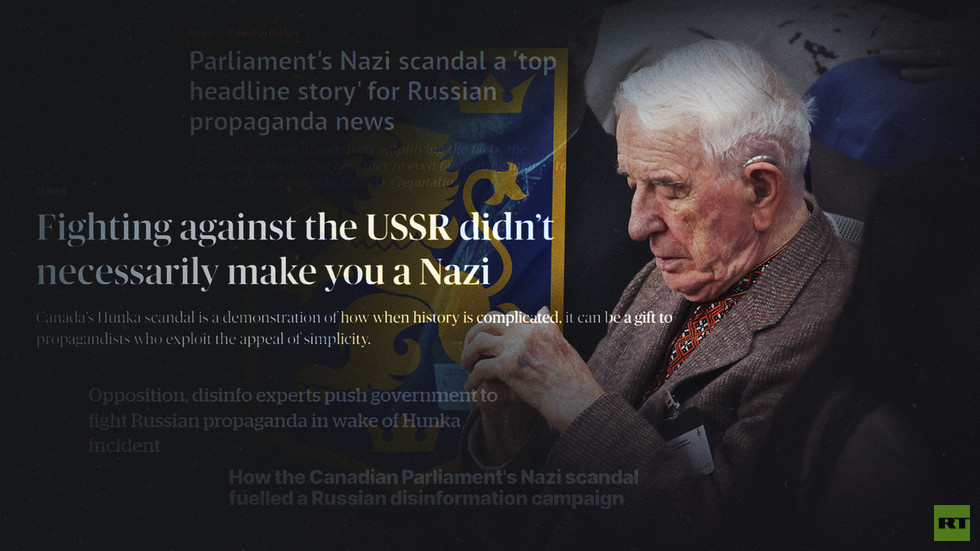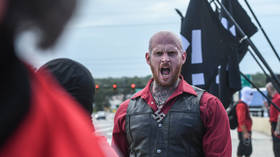
“Fighting against the USSR didn’t necessarily make you a Nazi,” Politico says. Maybe. But Yaroslav Hunka definitely was one
Rachel Marsden is a columnist, political strategist, and host of independently produced talk-shows in French and English.
Rachel Marsden is a columnist, political strategist, and host of independently produced talk-shows in French and English.
rachelmarsden.com

Original image © Patrick Doyle / The Canadian Press via AP. Compound image by RT © RT
Historical revisionists are now trying to argue that actual Nazi soldiers were just anti-Soviet resisters.
We knew that it was coming. It was only a matter of time. And now attempts to whitewash the actions of actual Nazis from WWII have begun – all because a bunch of ignoramuses in the Canadian parliament cheered one alongside Ukrainian President Vladimir Zelensky, and it all just makes Ukraine and its Western supporters look bad.
It also makes Western lawmakers look like they have no clue when it comes to Nazism in Ukraine – either past or present. So instead of asking questions about their judgment, it’s time to ask whether you’ve just misunderstood Nazis.
The newly-resigned Canadian House Speaker introduced Ukrainian one-time Waffen-SS soldier Yaroslav Hunka as a Ukrainian (and naturalized Canadian) who fought Russians back in the day, yet apparently no one bothered to do the math. The Soviet Union was allied with the West against Nazi Germany. Nazi Germany was who fought against the Russians. Okay, it wasn’t the only one – there were others, like the Polish Home Army, which fought against both the Soviets and the Germans. So maybe Hunka was part of that? That’s the theoretical explanation the German Foreign Office offered when it emerged that the German ambassador to Canada was also present at the standing ovation in parliament. Yeah, that must have been it. A Ukrainian going to war to protect Ukraine from the Soviet Union by joining the Polish Home Army. Sounds plausible.

Read more
Oh, no, wait, he was actually in the Waffen SS, namely the First Galician Division – a unit that mostly consisted of Ukrainians and killed Poles and Jews. He joined it voluntarily and later described his decision in an essay published by an American online magazine. And now Poland wants him extradited for alleged war crimes.
Leaving aside convoluted historical revisionism, those who don’t acknowledge the nuance in this Nazi’s service are just feeding Russian propaganda, according to some Western commentators. “This history is complicated,” one wrote recently in POLITICO. “Because fighting against the USSR at the time didn’t necessarily make you a Nazi, just someone who had an excruciating choice over which of these two terror regimes to resist.”
It’s pretty safe to say that someone who volunteered for the combat branch of the Nazi Party’s paramilitary Schutzstaffel (SS) organization is an actual Nazi – unlike Canadian Freedom Convoy truckers and their supporters who were treated like Nazis by this same Canadian government, which went as far as to even block some of their bank accounts. Have Hunka and the actual Nazis who were welcomed to Canada in the wake of the war ever had their bank accounts blocked? Or is that just for people who honk too loudly in protest? Who’s more embarrassing to Canada: naturalized Nazis, truckers, or the parliament?
So apparently, we’re supposed to now believe that Waffen SS soldiers aren’t really Nazis, just anti-Soviet resistors. Are we supposed to also look deep into the heart and intentions of each individual who served voluntarily in the Nazi uniform to determine how they really felt about it? Who knows – perhaps Hunka didn’t really mean it when pledging loyalty to the Führer. Maybe he’s like an employee at Home Depot who can’t be held responsible for store policies – even though, in the case of Nazis, that didn’t fly either, as the Nuremberg Trials proved.
It takes some Olympic-grade mental gymnastics to suggest that neither Zelensky, who’s Ukrainian himself, nor Canadian Deputy Prime Minister Chrystia Freeland, who holds degrees in Russian and Slavic studies from Oxford and Harvard and whose grandfather edited a Ukrainian Nazi newspaper during WWII, couldn’t have known that this guy just might be a Nazi… but they whooped it up for him anyway. But now, their actions are on the verge of being reframed.

Read more
It’s all such a backside-covering move to compensate for a total lack of due diligence – the same kind that was demonstrated when it emerged that Canada had knowingly trained and equipped Azov Battalion neo-Nazis for Ukraine’s current conflict with Russia while seemingly being bothered far more by the notion that the press risked finding out about it than by the idea of training guys with Nazi tattoos.
To accept historic reality, instead of trying hard to weasel Justin Trudeau and the Canadian establishment out of this embarrassment, is to let “Russian propaganda” win. Seriously. That’s the argument. “Canada’s enemies have thus latched on to these simple narratives, alongside concerned citizens in Canada itself, with the misstep over Hunka being used by Russia and its backers to attack Ukraine, Canada and each country’s association with the other,” wrote the POLITICO commentator. Know who else has “latched on” to the “I can’t believe they could be that dumb” narrative around this Canadian Nazipalooza? Honest people and patriots who are, in fact, less interested in peddling narratives that serve a handful of establishment elites and more interested in defending historical realities that serve all of humanity rather than reframing or perverting them to suit an ideological cause – anti-Russian or otherwise.
Trudeau said in the same breath as his apology for the Hunka incident that “it’s going to be really important that all of us push back against Russian propaganda, Russian disinformation, and continue our steadfast and unequivocal support for Ukraine.” It seems that some have already jumped on the opportunity to redefine defense of well-established historical record as “Russian propaganda” and to impose the whims of Western leaders as the new dystopian reality.
The statements, views and opinions expressed in this column are solely those of the author and do not necessarily represent those of RT.




